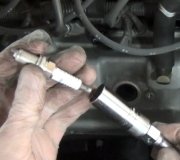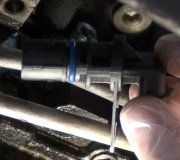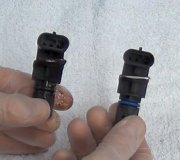I'm happy you're happy, but let me play devil's advocate for a bit. Obviously the proper thing that should have been done would be to admit the mechanic broke something, and the shop should pay for it, but consider what would have happened if you were doing this work yourself. Would you accuse yourself of doing something wrong or is it just bad luck and not really your fault? If it wasn't your fault, why would it be the mechanic's fault?
We see the same thing all the time with wheel lug nuts that customers install without using a click-type torque wrench. The damage was done by the owner but it doesn't show up until months later when the mechanic tries to get the lug nuts off, then a stud snaps or the threads are peeled and the nuts won't come off. That was caused by the previous person who worked on it, but the person working on it now gets blamed unfairly. Of course the owner expects the repairs to be done for free.
It is very often we run into corroded connectors and splices, rusty exhaust pipes, rusted-tight bolts, and things like that which break just from being touched and worked on. It is very possible the mechanic did nothing wrong, but due to corrosion and the ozone that develops around high voltage, the connector was deteriorated and ready to fail. That is a repair that you can be expected to be responsible for, regardless if it was going to occur in a few weeks or if it was hurried along by being handled now by the mechanic. If the mechanic took the proper and normal precautions to handle your truck with care, it's not his fault the coil broke. You asked for a 60,000 mile service and that involves removing the ignition coils to remove the spark plugs. If a connector was going to break, it was going to break regardless if you or he did it.
Now, even though this is not the mechanic's fault, all shop personnel know most owners will not understand that and they assume everything that goes wrong IS the mechanic's fault. We've all had some more unreasonable people who blame everything on the mechanic that goes wrong for months afterward. To avoid arguments and hard feelings, almost all service managers approve of any remedial actions that don't cost their bosses money, but that often transfers to mechanics DOING those additional repairs without telling anyone. As an example, while doing a typical rear-wheel brake job, I've had hold-down hardware and springs break due to severe rust AND being handled during removal. I always had a boxful of spare parts, and I'd install one of those without telling anyone. Legitimately I could request the customer pay for a new hardware kit which would restore those brakes to like-new condition, but that means my service adviser would have to write up a revised estimate after finding out the cost from the parts department. He'd have to try to make contact with the customer, explain the situation and why those parts weren't included in the original estimate, get the approval, then make sure the parts were in stock or available to be delivered from a parts store. Then he has to put all his other customers on hold while he runs back and tells me to go ahead and get the parts. I'd have to sit and wait for the parts to arrive while all my other customers were waiting to get their cars into the shop. It's easy to see why it's far more productive to just pop on a used part that is no older than all the other parts in that system.
There's a number of reasons to not say anything. First of all, you'd think people would be grateful, but instead, many of them would be disgruntled that I didn't install ALL used parts to save them money. The bigger problem goes back to when I started out in tv repair in the early '70s. One of my miserable jobs was to check tubes in the old spider web-infested, cow manure-covered, five-tube barn radios! Yuck. If I found one bad tube and replaced it, the total repair bill might be ten bucks, and they'd happily pay that. We'd make a dollar profit on that tube. (Remember, this was the '70s). If I found two bad tubes, the repair might be fifteen bucks, and there was a real good chance they'd say, "forget it. We'll just buy a new radio". Now I have an hour invested in the diagnosis and we get nothing in return. Can't stay in business that way. Instead, if we have one good used tube, we can put that in, sell them the other new one, and we're both happy.
It was STILL important that we didn't tell them what we did to save them some money. They'd ask why we didn't install TWO used tubes, but more importantly, what if that used tube went bad in a few days or weeks? Customers understand if a new tube fails and we replace it for free, but if a used one fails, 90 percent of them are angry they had to go through all the work of taking the radio down again and returning to the shop a second time. That free tube just cost us some customer satisfaction and a bad reputation for installing used parts. Instead we would tell them our new tube failed, and quietly replace our failed used one, or we'd explain this was a different problem but we could help them out by fixing it at no charge.
You see why we never advertise that we installed used parts. No matter what good intentions we have in mind, it always comes back to bite us.
Sorry for getting off the subject. Upper strut mounts on cars often rust out in the middle but don't cause any symptoms until they're disassembled to replace the struts. THAT is when we find the wear and have to tell you more parts are needed than were first thought. This is another example of something that causes hard feelings. To avoid that, and since this is known to be a common problem, we usually include all those parts in the repair estimate, then we don't replace them or charge for them if they're found to be okay. In the case of your ignition coils, if deteriorated connectors were a common problem, ideally they should have warned you ahead of time. If more than one broke, the mechanic should have stopped after the first one and told the service adviser who would have had a conversation with you as to how YOU wanted to proceed. Armed with the knowledge that there were brittle parts, you could have made an informed decision to stop and put everything back together so you could take it home and break the rest of them yourself. It is entirely possible the mechanic did nothing wrong except to get involved with parts known to cause problems. Ask yourself how often YOU got involved with something that broke while you were taking it apart, and you know you did nothing wrong.
By the way, I had one student with a reputation for breaking things on customers' cars. I stood next to him one day and watched as a brake rotor crumbled in his hands just as he started to remove it. We both know he didn't do anything wrong, and he surely wasn't using excessive force, yet he would have been ridiculed by the other kids if I hadn't seen it for myself. Would it be fair to the shop to make them pay for that rotor? If it wasn't corroded, it wouldn't have fallen apart, and the student didn't cause the corrosion. This was the car owner's responsibility, and fortunately, in this case, the owner understood what happened. One of the big problems we have in this field is mechanics have real good communication skills, ... Among other mechanics, but not with customers. That's why we have service advisers, who usually never were mechanics, but they have good communication skills and try to interpret what they're told by the mechanic and then translate that into something they think you will understand. You know something is going to get lost in translation, but that doesn't mean there's an intentional attempt to deceive or defraud.
I moved some paragraphs around here. I hope my story still flowed smoothly and made sense. I'm not saying anyone is right or wrong related to your truck. I just wanted to show some of the things going on in a conscientious mechanic's mind that is not common knowledge. The only question I still have is how they came up with the repair estimate and why it's so high. Dealerships use factory parts and in the past you could expect to pay ten to twenty percent more than at an independent shop, but that is starting to change for some repairs. Independent shops have to spend many thousands of dollars each year for equipment and very expensive updates, and for very expensive aftermarket schools. They need to charge accordingly to recover those costs. Dealerships have high-level training supplied by the manufacturers, and they only buy equipment related to the brands they sell. Because of their training, experience, and repeatedly seeing the same models over and over, they can diagnose most problems much faster than the independent shops, and that can save you money.
Monday, February 23rd, 2015 AT 2:53 PM






